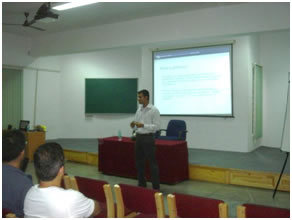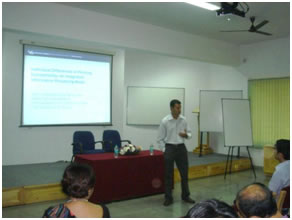
- This event has passed.
Special Lecture (17) Individual Differences in Phishing Susceptibility: An Integrated Information Processing Model by Dr. Arun Vishwanath, Director of Graduate Studies, Associate Professor, Department of Communication, Adjunct Associate Professor, Management Science & Systems, State University of New York at Buffalo, USA.
November 30, 2011
Special Lecture Abstract:
Dr. Arun Vishwanath besides explaining the nuances of Phishing also presented an integrated information processing model related to phishing susceptibility. In the light of his extensive research work on the topic, he helped the audience understand the different methods, approaches that can be used to mitigate the damage phishing can cause. Based on his research he presented an integrated information processing model of phishing susceptibility grounded in prior research in information processing and interpersonal deception. The model is refined and validated on a sample of intended victims of an actual phishing attack. The data provides strong support for the model’s theoretical structure and causative sequence, explaining close to fifty percent of the variance in individual phishing susceptibility. The results indicate that most phishing emails are peripherally processed and individuals make decisions based on simple cues embedded in the email. Interestingly, urgency cues in the email stimulated increased information processing thereby short circuiting the resources available for attending to other cues that could potentially help detect the deception.
The findings of the phishing study suggest that habitual patterns of media use combined with high levels of email load have a strong and significant influence on individuals’ likelihood to be phished. Consistent with social cognitive theory, computer self-efficacy was found to significantly influence elaboration, but its influence was mitigated by domain specific-knowledge. The presentation covers the model, its tests, the findings of the study, as well as the ways in which individuals can reduce their susceptibility to phishing based deception.
Having given an overview of the study carried out in the US context, he also asked the participating students to leverage and extend similar study in the Indian context.
Speaker Profile:
Arun Vishwanath, Ph.D., MBA, is Associate Professor of Communication and the Director of the Graduate Program at the University at Buffalo. He is also an Adjunct Professor in the Department of Management Science & Systems. His research focuses on cognitive, affective, and behavioural consequences of information on technology adopting units ranging from individual consumers and households to cultures and health care organizations. His research takes a systems theoretic approach and focuses on the dynamic, embedded nature of decision-making within interdependent system domains and the role of information in shaping the present and future states of such systems.


